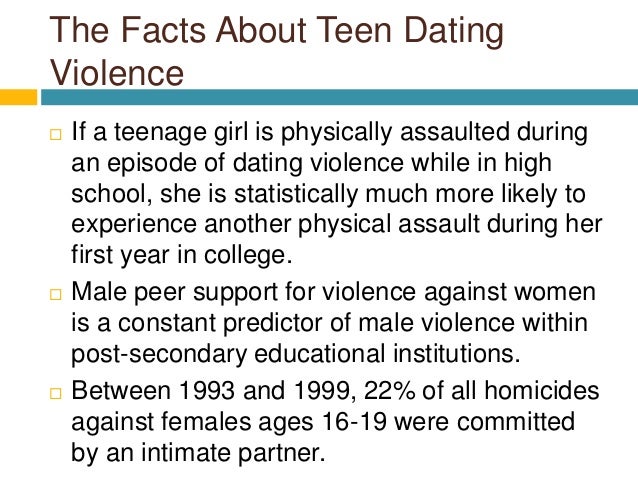Causes of Violence in Teen Dating. Violence in teen dating may be more widespread than you think. The Centers for Disease Control and Prevention (CDC) reports that one in four adolescents experiences some type of abuse from a partner each year. Whether it's physical, emotional or sexual, the cycle of abuse stems from immaturity and a desire to control another human being. Dating For Cancer Patients on this page. If your child seems to be suffering from an abusive partner, it's important to understand the causes of violence in teen dating so you can know how to help. Low self- esteem can plague either partner in a teen relationship and act as a catalyst to abuse.
Learn the Facts Family violence is knowable, predictable, and preventable. Knowing the facts about domestic violence is the first step in supporting victims in their. Free articles, quizzes, answers to teens' questions about recognizing and dealing with violence or abuse. The Centers for Disease Control and Prevention (CDC) reports that one in four adolescents. Loveisrespect is the ultimate resource to empower youth to prevent and end dating abuse. It is a project of the National Domestic Violence Hotline.
When an abuser has low self- esteem, he may seek to control his partner's behavior since he doesn't feel worthy enough that she'll be faithful. When the victim has low self- esteem, she may not believe that anyone else will love or spend time with her, perpetuating the cycle of abuse and violence in her relationship. Teens are only just beginning to understand what being in a relationship means. Because of their inexperience, dating abuse can be seen as acceptable with nothing else to compare the behavior to, notes the Alabama Coalition Against Domestic Violence. When two teens who have no experience in relationships begin spending time with each other, they begin to form their own definition of what is acceptable.
Some eye opening information on teen suicide statistics, suicide prevention, and warning signs to help avoid teenage and adolescent suicide attempts. Dating Violence Surveys Do you know what dating violence is? Why is it so difficult for victims to leave abusive dating relationships? What role do alcohol or other.
Empowering youth to end domestic violence. Welcome to Teen Violence Statistics. Statistics show youth violence is becoming a huge problem throughout the world. The purpose of this website is to help educate. Teen Dating Violence. Nearly 75 percent of teens dated or went out with someone in the previous year. Of those teens, at least 10 percent of adolescents say they have.

Some signs of domestic violence are more obvious than others. Know how to look for the warning signs for domestic violence. This white paper examines the complex issue of teenage dating violence and the obstacles teens face when deciding to end an abusive relationship. Domestic abuse is not limited to adults; there is an increasing awareness of domestic violence within teen relationships.
Teen Dating Violence Facts In Georgia
To some, abuse and violence are simply part of a normal relationship. If a teen witnesses her parents constantly embroiled in abusive situations, she begins to believe that a relationship entails abuse factors such as control, humiliation or physical violence. She then goes on to perpetuate the cycle by allowing it to occur within her own relationship or abusing her partner in a variety of ways. Teens are fairly new to relationships and society, and will sometimes exhibit the same behaviors prevalent in their homes. Teens may often feel pressured to present a certain image to their violent friends, which can sometimes become the cause of teen dating violence, notes the CDC. A teenager who hangs out with a tough group of friends may feel as though he needs to make an example of how well he can control his girlfriend by humiliating her or physically abusing her in front of friends.

Teens still have immature emotions and are not yet well equipped to deal with something as adult as a romantic relationship. This is why responses like jealousy and control can sometimes enter and taint a relationship with violence, according to Help. Guide. A teen who doesn't know how to properly communicate her feelings about jealousy to her partner may find other ways to express her feelings, like withholding affection or calling her boyfriend names.